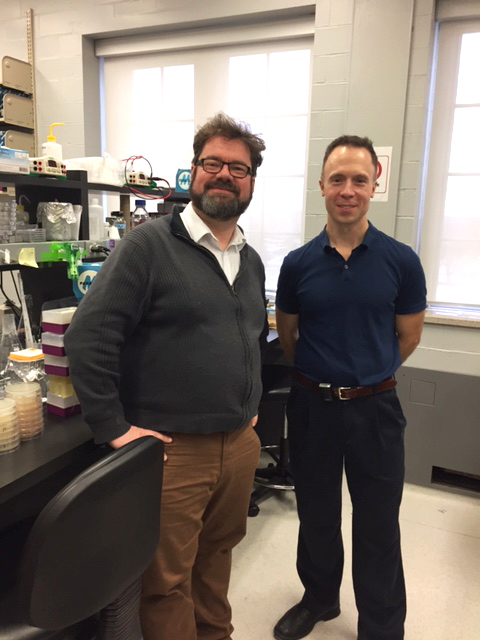

Parkinson’s disease is a neurodegenerative disease, meaning it affects the nervous system and worsens over time. Dopamine is a chemical that controls movement and carries signals between the nerves in the brain. Parkinson’s disease develops when the cells that typically produce dopamine die.
Parkinson’s Disease remains an incurable and progressive disease. It results in overwhelming hardship and early death of millions of people each year. Treatments control symptoms, but not the progression of the disease, and often have severe side effects affecting patients’ quality of life.
Lawson Health Research Institute’s Internal Research Fund (IRF) has awarded a grant to Dr. Matthew Hebb and Dr. Martin Duennwald, Associate Scientists at Lawson, to study newly discovered brain-derived progenitor cells (BDPCs) to treat Parkinson’s disease. BDPCs naturally produce neurotrophic factors (NTFs), some of the most protective agents known in Parkinson’s disease.
The research team is studying if the BDPCs, originally characterized by Dr. Hebb’s team, can be isolated and grown in conditions acceptable for clinical use. Their ultimate goal is to use these highly unique and protective cells in transplantation therapy for patients with Parkinson’s disease. Cell transplantation holds promise for replacing dying brain cells and delivering therapies that protect or reverse the damaging symptoms of Parkinson’s disease.
“Our discovery of BDPCs reveals new insight into the human brain and potential unexplored avenues,” states Matthew Hebb. “BDPC-based therapy could offer an entirely new therapeutic option for regenerative medicine in neurological diseases.”
“The unique properties of BDPCs motivate our project to explore their molecular and therapeutic potential in our collaborative research project.” adds Martin Duennwald.
Slowing the progression or, hopefully, reversing symptoms, this treatment could also benefit patients with other neurological diseases. The hope is that BDPC therapy could offer a promising and personalized strategy to improve the quality and longevity of patients’ lives.
This study takes the next steps in moving this critically-needed, innovative technology closer to being used in clinical settings.
The IRF is designed to provide Lawson scientists and students the opportunity to obtain start-up funds for new projects with the potential to obtain larger funding, be published in a high-impact journal, or provide a clinical benefit to patients. Funding is provided by the clinical departments of London Health Sciences Centre and St. Joseph’s Health Care London, as well as the hospital foundations (London Health Sciences Foundation and St. Joseph's Health Care Foundation).

Above: Drs. Martin Duennwald and Matthew Hebb, Associate Scientists at Lawson